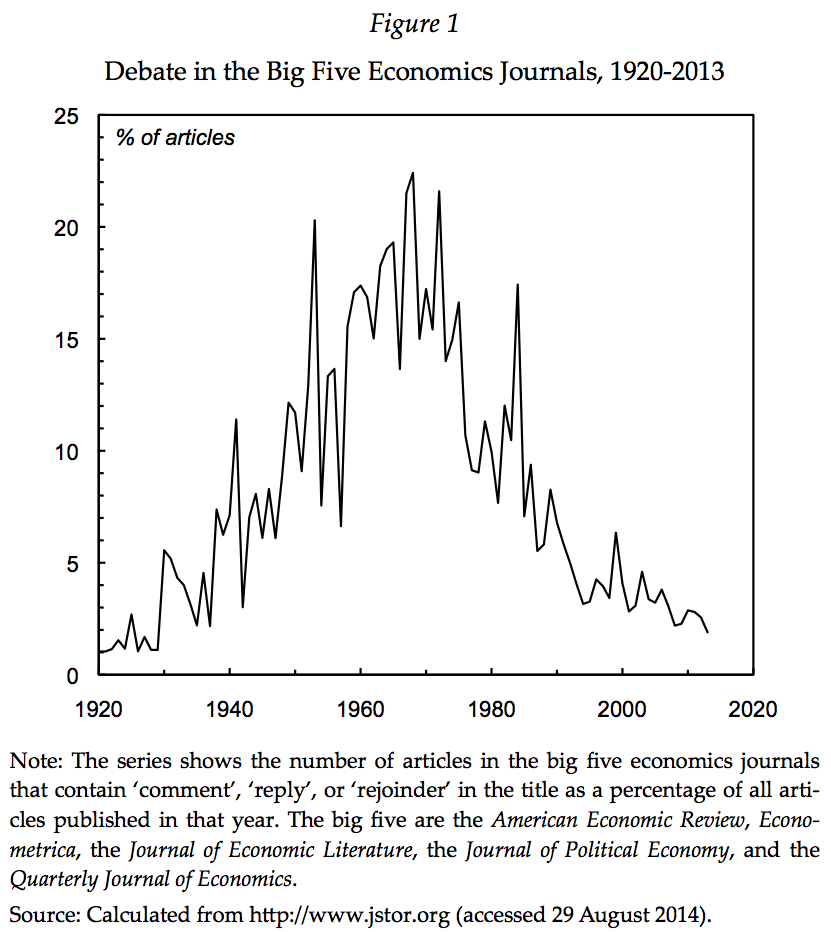New data illustrate the extent to which economists have stopped discussing each other’s work.
Once upon a time, economists regularly used to publicly criticise each other’s work in academic journals. But not any more.
In Figure 1 I have illustrated the degree to which economists have stopped debating. The data have been culled from Jstor, the online database of academic journals. To estimate the number of debating articles for each year, I searched for articles with “comment”, “reply”, and/or “rejoinder” in their titles, as these are the key words used to indicate a comment on someone else’s article and a reply to that comment. I did the search for the five most prestigious economics journals. I then used the total number of articles in those five journals in each year as the denominator.

Figure 1 shows how there was a dramatic increase in the level of debate in economics from the 1920s through the 1960s. Then, however, there was an equally dramatic fall. At the peak level, in 1968, fully 22 per cent of the articles published in these journals appear to have been related to debate. By 2013, however, just 2 per cent were.
Why did this rise and fall happen?
The rise in the debates began in the 1930s, presumably as economists suffered from pangs of Great Depression-inspired doubt. Keynes did most to increase the level of debate, while the strength of Marxist ideas must also have played an important part in encouraging a culture of cantankerousness. Paul M. Sweezy, North America’s leading Marxist economist, for instance, contributed to the debates in these journals (see Sweezy 1950a, 1950b, 1972).
The decline in debate then appears to have been associated with the emergence of a ‘neoliberal’ hegemony from the 1970s onwards. Keynesianism wilted, while Marxists were forced back into their niche publications. It is notable, for example, that Robert Pollin, arguably North America’s leading Marxist economist today, has only ever published one, six-page article in any of these journals (see Pollin 1985).
The rise, then, was associated with the challenges to the old liberal orthodoxy, while the decline has been accompanied by the establishment of a new liberal orthodoxy. That, at least, would be my rough sketch of what happened.
The question then becomes whether it mattered. In my opinion, a lack of debate would not matter if economists had successfully answered all the questions they are supposed to ask. Recent events, however, suggest that they may not have done.
References
Pollin, R., ‘Stability and Instability in the Debt-Income Relationship’, American Economic Review, 75:2, 1985, pp. 344-50.
Sweezy, P.M., ‘The Varga Controversy: Comment’, American Economic Review, 40:3, 1950a, pp. 405-06.
_________., ‘The Varga Controversy: A Reply to Professor Domar’, American Economic Review, 40:5, 1950b, pp. 898-99.
_________., ‘Comment’, Quarterly Journal of Economics, 86:4, 1972, pp. 658-64.

One more suggestion: Comments or Replies attract far fewer citations than standard articles. With Leigh Gardner, I included a dummy for responses/comments/replies in a regression of citations in the top four Economic History journals.* We found that each response/comment/reply receives about 12 fewer citations, ceteris paribus. With increasingly limited page space in the top journals, it is understandable that editors prefer standard articles to responses. Whether this can explain the rapid decline since the 1970s, I’m not sure, but it is at least another plausible hypothesis.
* http://dx.doi.org/10.1080/20780389.2014.922842
It would be interesting to know whether editors disproportionately reject comments for publication.
The incentives may also be there on the side of authors: they want ‘high impact’ articles that receive lots of citations, so they don’t bother writing comments on other people’s work.
Early in my career, I used to read a lot of economic literature, and often had views, mostly about the knowledge or the method. The comments I sent on articles were routinely, almost mechanically rejected. So I gave up. Now that we have a new product in blogs, I wish some would specialize in discussing and criticising ideas; that is the only way dross can be removed and solid ideas emerge.